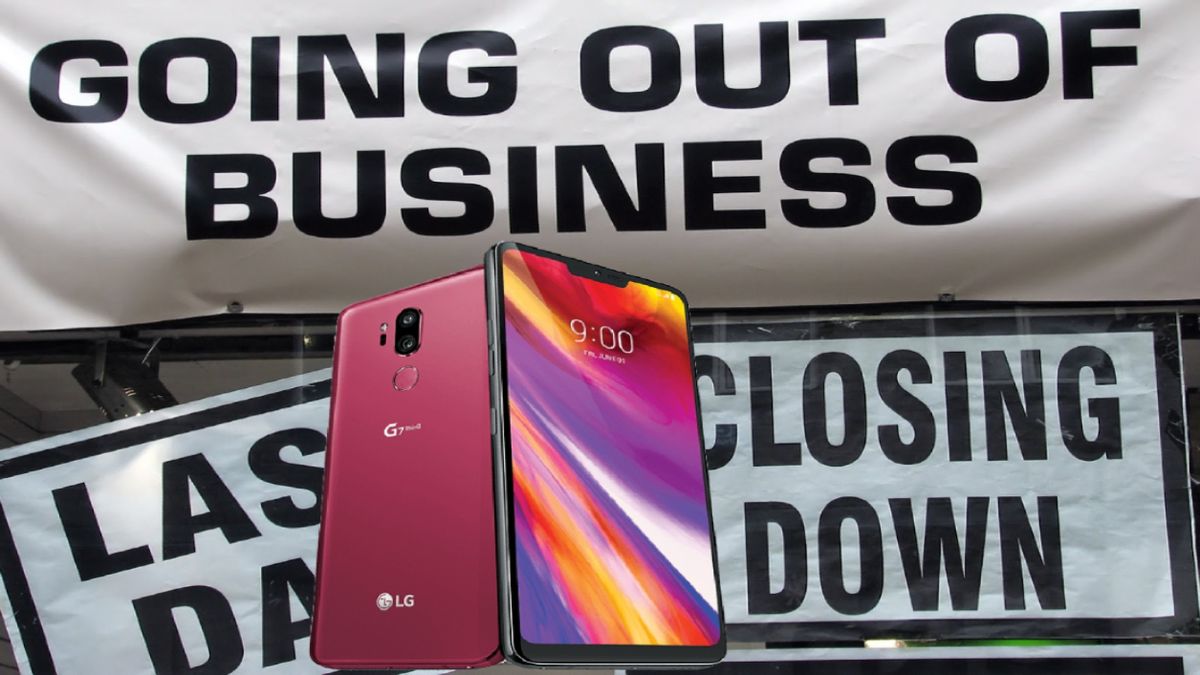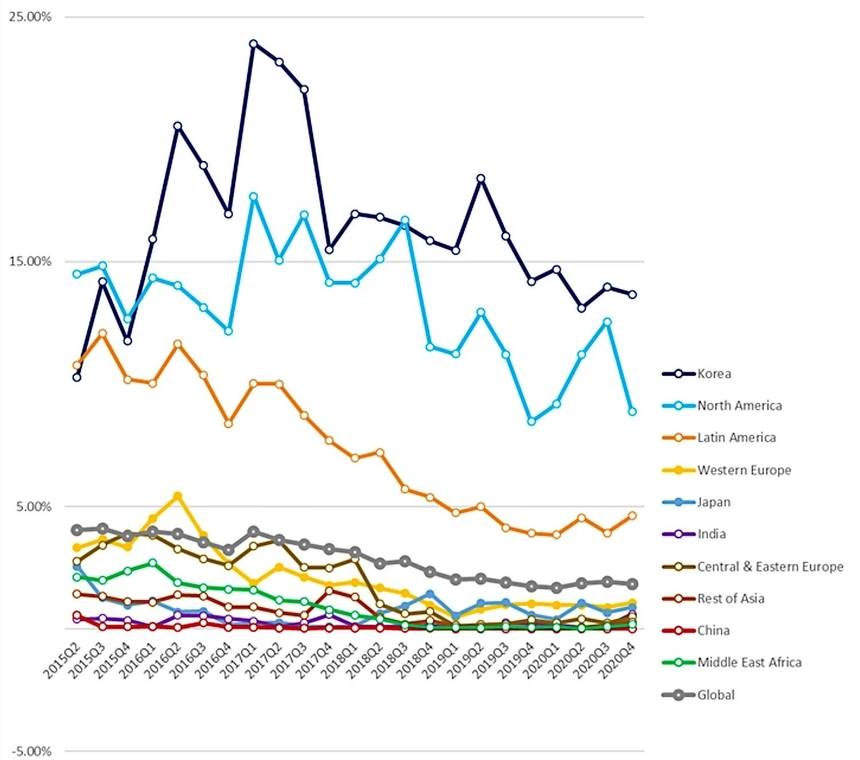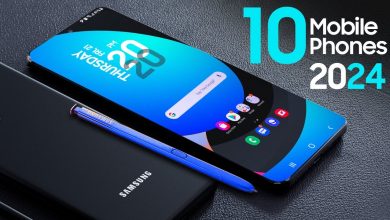The End Of LG Smartphone Business
LG shutting down Chart: The End of LG Smartphone Business: A Shift in Focus and Closure. Explore the journey of LG Electronics as it shuts down its smartphone business, making way for new growth areas.
LG Electronics, a trailblazer in the Android world, recently announced the closure of its mobile phone business. This strategic move will enable the company to redirect its resources towards other growth areas such as electric vehicle components, connected devices, smart homes, robotics, artificial intelligence, and business-to-business solutions. The decision to wind down the mobile business unit is expected to be completed by July 31, 2021. In this article, we will delve into the factors that led to LG’s exit from the smartphone market, the impact on the industry, and the company’s future plans.
A Challenging Landscape LG
1. The Decline of LG
Once a leading smartphone manufacturer, LG faced significant challenges in recent years. Despite being a top-three player in the U.S. smartphone market, the company struggled to compete globally with dominant players like Apple and Samsung. Over the past few years, LG’s smartphone division reported consecutive losses, totaling billions of dollars. The company’s last profitable year in this segment was in 2014. Fierce competition from Chinese brands like Xiaomi, Huawei, and Oppo, which offered feature-packed devices at competitive prices, further eroded LG’s market share. As a result, LG’s global share of smartphone sales dwindled to a mere 2%.
2. Ineffective Innovation
Despite its reputation for innovation, LG’s smartphone designs and features failed to resonate with consumers. The company introduced unconventional devices like the LG G Flex, a curved smartphone, and the LG Wing, a T-shaped smartphone with dual displays. While these devices showcased LG’s willingness to experiment, they lacked practical value and failed to gain mainstream popularity. In contrast, LG’s more traditional smartphones struggled to differentiate themselves from competitors like Samsung, limiting consumer appeal. Furthermore, the company faced criticism for poor build quality and subpar software update support, tarnishing its reputation with customers.
3. Business Strategies and Partnerships
LG’s attempts to revive its smartphone business included various strategies and partnerships. In 2020, the company expressed its commitment to making the division profitable by 2021. It explored options such as outsourcing the design of low- and mid-range handsets to third-party manufacturers and even considered selling the smartphone business altogether. However, these efforts did not yield the desired results, leading to the ultimate decision to exit the market.
The Way Forward
1. Focusing on Growth Areas
With the closure of its mobile phone business, LG aims to concentrate its resources on growth areas that align with its expertise and capabilities. Electric vehicle components, connected devices, smart homes, robotics, artificial intelligence, and business-to-business solutions will now be the company’s primary focus. This strategic shift allows LG to leverage its technological prowess and compete in sectors that show significant potential for future growth.
2. Retaining Core Technologies
Although LG is exiting the smartphone market, the company will retain and apply the core technologies it developed during its two decades in the mobile business. These technologies can be leveraged in existing and future products, ensuring that LG’s expertise continues to drive innovation in its new focus areas. Additionally, LG will continue its research and development efforts in mobility-related technologies, including 6G. This commitment to technological advancements will help the company strengthen its competitiveness in other business sectors.
3. Support for Existing Customers
LG is committed to providing support for its existing mobile products, including service support and software updates. While the duration of this support may vary by region, the company aims to ensure a smooth transition for its loyal customers. However, the future availability of LG smartphones may be limited as the company winds down its mobile business operations.
Impact on the Industry
1. Void in the Smartphone Market
LG’s exit from the smartphone market leaves a void in the industry. The company’s departure will create an opportunity for competitors to fill the space it once occupied. Samsung, as the leading smartphone manufacturer, is likely to benefit from LG’s absence, along with other players in the market. Smaller manufacturers may also seize the opportunity to gain market share previously held by LG.
2. Lessons Learned
LG’s journey in the smartphone business serves as a reminder of the challenges faced by companies operating in the highly competitive mobile market. The failure to adapt to changing consumer preferences, deliver compelling value propositions, and establish a strong brand presence can have significant consequences. LG’s experience highlights the importance of continuous innovation, effective marketing strategies, and timely adaptation to industry trends.
The closure of LG’s smartphone business marks the end of an era for the company as it shifts its focus towards new growth areas. The challenges faced by LG in the smartphone market, coupled with intense competition and changing consumer preferences, led to this strategic decision.
By redirecting its resources to sectors with promising prospects, LG aims to leverage its expertise and core technologies to drive innovation in electric vehicle components, connected devices, smart homes, robotics, artificial intelligence, and business-to-business solutions. While LG’s departure from the smartphone market creates opportunities for competitors, the industry can draw valuable lessons from LG’s journey. As LG embarks on this new chapter, its legacy of technological innovation and commitment to excellence will continue to shape its future endeavors.
The end of LG’s smartphone business wasn’t simply a market failure; it was a strategic move to adapt to changing circumstances and pursue newer opportunities. By focusing on emerging technologies and leveraging its existing strengths, LG aims to secure a more sustainable future in the ever-evolving landscape of the tech industry.
Additional Information:
The closure of LG’s mobile phone division raises questions about the future of LG’s innovative devices, including the much-anticipated rollable smartphone. While LG’s existing inventory will remain available for sale, the fate of the rollable phone remains uncertain. The company had previously announced plans to launch the device in 2021, but it is now unlikely to see the light of day.
LG’s departure from the smartphone market also evokes nostalgia among consumers and industry experts who recognize the company’s willingness to take risks and push the boundaries of smartphone design and features. The closure of LG’s smartphone business serves as a reminder of the ever-evolving nature of the technology industry and the need for companies to adapt and innovate to stay competitive.




